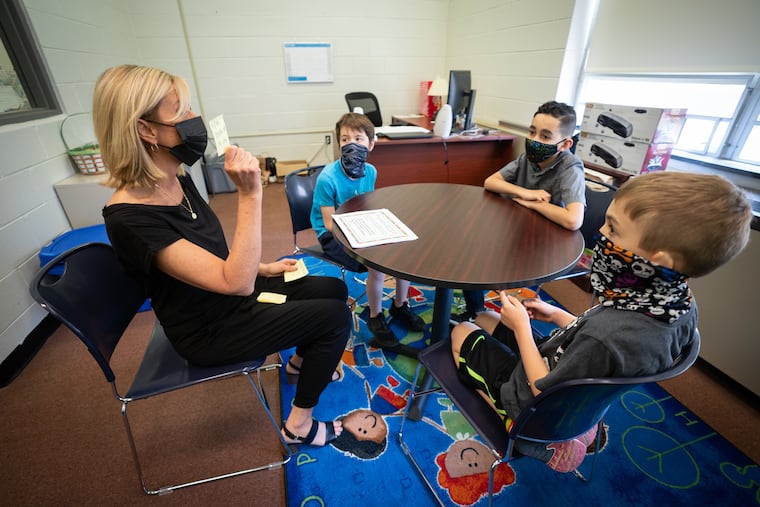Clayton model adopted around N.J. to help students cope with social and emotional needs
Clayton School Superintendent Nikolaos Koutsogiannis believes an intervention program addressing students' social emotional learning needs will help others in the state.

Before the morning bell rings at Herma Simmons Elementary in Clayton, counselors prepare to handle any jitters that could keep their young students from learning.
They are assigned to a Child Connection Center in a brightly decorated room that houses the social emotional intervention program. Started in 2009, the initiative provides support to students, teachers, and parents at the sprawling South Jersey school, and seeks to address potential problems before they escalate.
It has been credited with drastically improving the school culture, researchers say. There have been fewer absences, suspensions, expulsions, behavior reports, and classroom disruptions that could make it difficult for students to learn, they say.
The initiative goes beyond current programs that use Individualized Education Plans, or IEPS, to help develop any counseling needed, but is open to all students, especially those considered at-risk.
The program recently impressed state officials so much it has been adopted as a pilot for New Jersey public schools under a law signed last month by Gov. Phil Murphy. Known as “the Clayton model,” it will be expanded to up to 30 schools across the state by 2026.
“Proud is a good word,” Clayton School Superintendent Nikolaos Koutsogiannis said with a smile. “The program is going to help a lot of kids and a lot of families.”
Initially, the program will target thousands of students in kindergarten through fifth grades, in 10 schools in Gloucester County and two other counties in the north and central parts of the state. It is expected to cost between $2.4 million and $3 million for the pilot schools, and between $12.6 million and $27.5 million for the county special services district that will oversee them, according to the state Office of Legislative Services. It will be funded in part with federal COVID-19 funds meant to help students make up what they missed and address their social emotional learning needs.
» READ MORE: Billions of stimulus dollars are coming to Pa. and N.J. schools to help get them open again
Long before the pandemic, Clayton, which enrolls about 1,500 students, quietly began the intervention program, Koutsogiannis said. It grew over the years, and a social worker and behavioral specialists were added. They provide mental health counseling, help with classroom management, conduct character-building training, and make home visits, if needed, to help parents with coping strategies.
“We want to make sure kids are safe and ready to learn,” said Stephanie Chambers, a social emotional learning specialist, or SEL, with the Gloucester County Special Services School District, which is helping with the program.
Koutsogiannis said the program has been invaluable as students have returned to the classroom for in-person learning after more than a year of remote instruction. They missed the interaction with teachers and friends, such as recess on the playground. Some students experienced anxiety when they returned and had to adjust to a new routine, he said.
“This is going to be a big way of trying to get kids back to normal,” the superintendent said. “The effect is going to be a long time.”
On a recent school day, social emotional learning specialists met with students in the Child Connection Center. In one section, three boys sat around a small table discussing appropriate behavior for possible scenarios. In another, a girl told a counselor she was having a good day during a wellness visit.
When asked if they were allowed to be angry when a problem occurs, all three boys promptly replied, “Yes!” Asked what they could not do, they responded:
“You shouldn’t throw things,” one said.
“Don’t run away,” said another.
“You can’t hurt people,” the third said.
When a situation developed in a classroom, a teacher summoned a specialist who rushed to intervene. In another instance, the specialist escorted an emotional student to a room and patiently waited for the student to settle down before she could return to class. Students are encouraged to do wellness check-ins at the center in the morning to set goals for the day.
It was that type of interaction that spurred state Senate President Stephen Sweeney (D., Gloucester) to obtain funding to save the program. He visited the school in 2020 after learning that its funding was in jeopardy, and later cosponsored the bill expanding the Clayton model along with Assemblyman Adam Taliaferro, (D., Gloucester).
“When I saw this program, it was remarkable,” Sweeney said. “This is something that needs to be in every school in the state.”
Sweeney, who has an adult daughter with Down syndrome, said he was especially excited that the program gives priority to students with physical or developmental disabilities.
“It’s not a cookie-cutter program,” said Lisa Twomey, the program’s coordinator and a former district grant writer who came up with the idea for the program. “We really find out what they need.”
Besides Clayton, the program is currently operating elsewhere in Gloucester County at elementary schools in Monroeville, Deptford, Paulsboro, and Westville. Five more districts will be added. About 300 students and families have been served this year.
Clayton school officials will help replicate the program elsewhere in the state. Researchers at the Senator Walter Rand Institute for Public Affairs at Rutgers University-Camden are tracking the program and analyzing the results.
“This is the beginning of something really special for New Jersey school districts,” Sweeney said. “Giving every child an opportunity to succeed is what this is all about.”